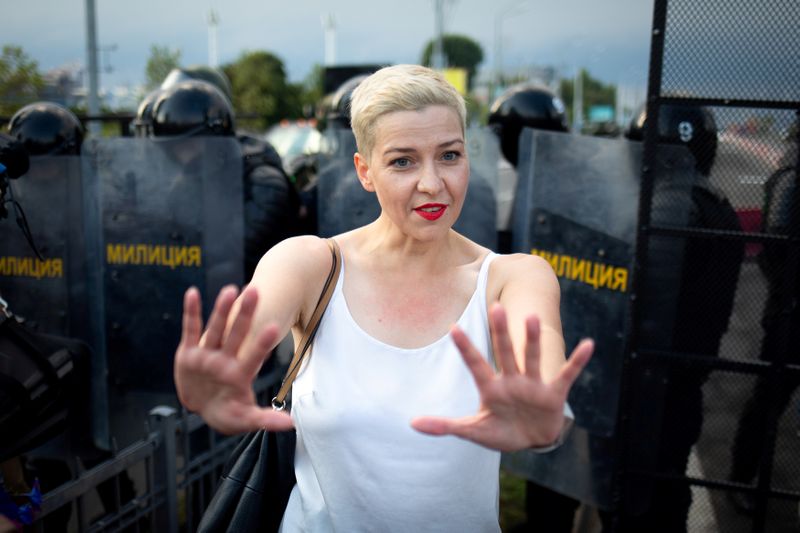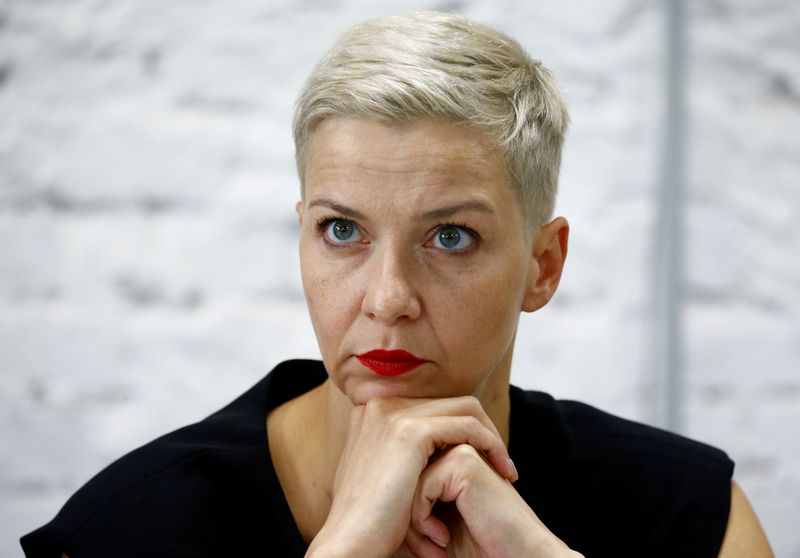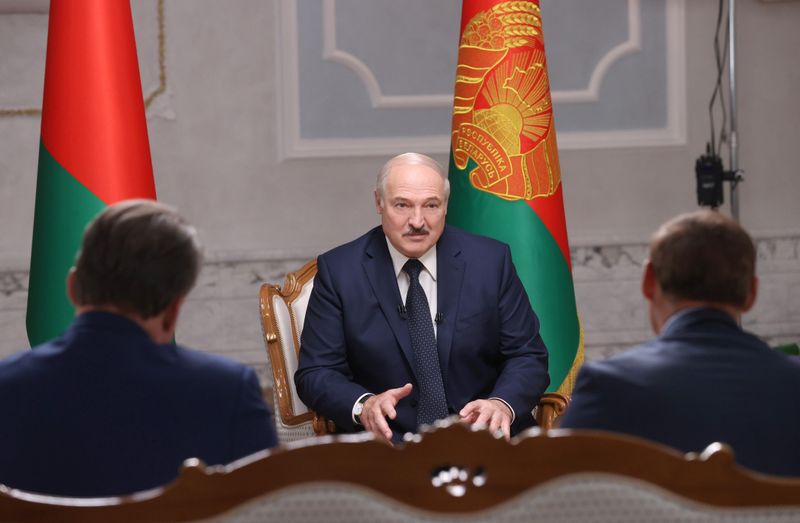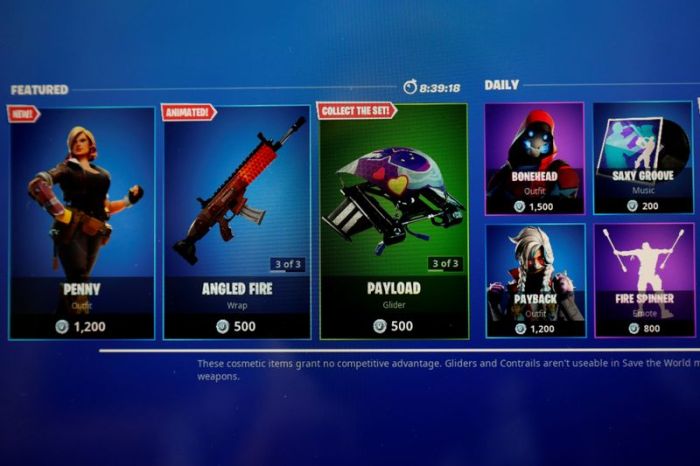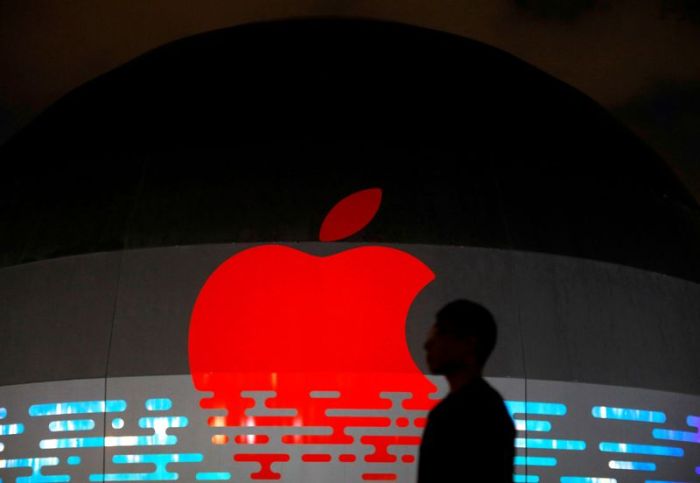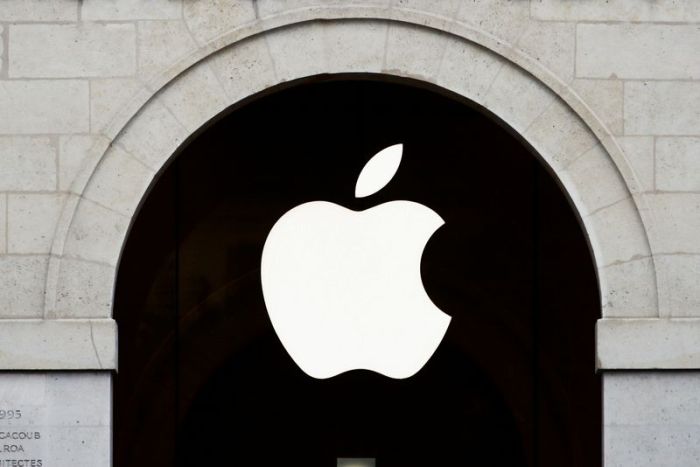KYIV (Reuters) – Belarusian authorities drove prominent opposition leader Maria Kolesnikova to the border with Ukraine on Tuesday, a day after she was snatched from the street in Minsk, but she tore up her passport so they could not force her to cross, two of her allies said.
The fate of Kolesnikova, a key figure during four weeks of mass protests against President Alexander Lukashenko, had been a mystery since supporters said masked men had whisked her away in a van on Monday. Belarusian police were quoted as saying they had not detained her.
Two fellow opposition figures, Anton Rodnenkov and Ivan Kravtsov, told a news conference in Kyiv that they had been detained by Belarusian officials in plain clothes, who escorted them to the border and then put Kolesnikova into their car and told them to cross.
“As soon as she ended up in the car and saw her passport, she immediately took her passport and tore it up into little pieces and crumpled the pieces and threw them out the window at the people standing around the car,” Rodnenkov said.
“After that, she opened the window and got out (through the window) and walked towards the Belarusian border.” There she was detained by the Belarusians again.
Kolesnikova’s disappearance followed the arrest or flight of other opposition figures before and since last month’s presidential election, which official results showed had been won by Lukashenko with 80% of the vote.
Deputy Ukrainian Interior Minister Anton Gerashchenko had earlier told Reuters Kolesnikova had successfully prevented “a forcible expulsion from her native country”.
“Maria Kolesnikova made a courageous act that did not allow the Belarusian special services to expel her to the territory of Ukraine,” he said. “All responsibility for her life and health is on Alexander Lukashenko, the dictator of Belarus.”
U.S. Secretary of State Mike Pompeo said in a statement Washington was “deeply concerned by the reported abduction” of Kolesnikova, Rodnenkov and Kravtsov.
He called on the Belarusian authorities to “release all those who have been unjustly detained, including U.S. citizen Vitali Shkliarov,” a political consultant detained in July.
LUKASHENKO
Lukashenko contradicted their account, saying her associates had thrown Kolesnikova out of the vehicle after being stopped by border guards and that she had then been detained.
Lukashenko also told Russian reporters he would not rule out holding new elections, but rejected any talks with opponents who he said were bent on steering the country towards disaster.
“Of course, for me, it’s very frustrating and tragic, if you wish. But it does not mean I gave up,” he said, adding that the majority of people had voted for him. “Maybe they are a little bit tired of me. But they supported me.”
Police detained dozens of people from among hundreds who protested on Tuesday evening in Minsk against Kolesnikova’s disappearance, some chanting “Maria, you are a hero”.
Masked police dragged some of the protesters away from the crowd, including some women who they pulled by their hair, a witness said.
Fellow opposition leader Sviatlana Tsikhanouskaya, who is in exile in neighbouring Lithuania, called for Kolesnikova to be released, telling Reuters that her detention would only inflame the anti-government protests.
Lukashenko, who has crushed dissent in Belarus for the past 26 years, conceded in his interview with Russian journalists that he may have held onto power too long.
“Yes, maybe I overstayed a bit,” Russian journalist Roman Babayan cited Lukashenko as saying.
But the 66-year-old leader said he was the only person capable of protecting the country for now.
Belarus has seen a tense political stalemate since the disputed presidential election on Aug. 9, with protesters flooding the streets and security forces responding with mass arrests and – according to some of those detained – beatings and torture.
The country of 9.5 million people is of key strategic interest to Moscow as a route for its oil and gas exports and a buffer between NATO and Russia.
Lukashenko denies opponents’ accusations of vote-rigging and has accused foreign powers of trying to topple him in a revolution. He retains the backing of Russian President Vladimir Putin, a key ally, but faces the prospect of European Union sanctions later this month against Belarusian officials involved in the election and its violent aftermath.
(Reporting by Maria Kiselyova, Vladimir Soldatkin and Alexander Marrow in Moscow and Matthias Williams, Pavel Polityuk and Sergiy Karazy in Kyiv and Andrius Sytas in Vilnius; writing by Mark Trevelyan, Tom Balmforth and Matthias Williams; editing by William Maclean, Philippa Fletcher and Marguerita Choy)

